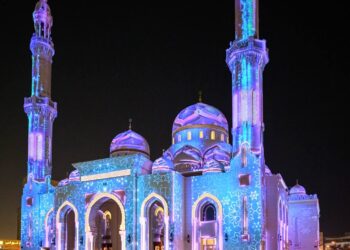As Nigeria marks the Prophet’s birth, his message of justice, humility, and compassion offers timeless lessons for a troubled world.

By The Merit Newspaper Religion Desk
Tomorrow, Friday, September 5, 2025, Nigeria joins much of the Muslim world in observing a public holiday to commemorate the birth of Prophet Muhammad (peace be upon him). For many, the day is marked by prayers, gatherings, and reflection. Yet beyond the ceremonial rest, it is a moment to pause and ask a deeper question: Who was Prophet Muhammad, and why does his life continue to inspire over 1.9 billion people across the globe more than 1,400 years after his birth?
Born in Mecca in 570 CE, into the Quraysh tribe, Muhammad ibn Abdullah’s early life was far from one of privilege. Orphaned at a tender age, he grew up under the care of relatives, working as a shepherd and later as a merchant known for his honesty and trustworthiness—qualities that earned him the nickname Al-Amin (the trustworthy). This integrity would later define his prophetic mission.
At the age of 40, during solitary reflections in the cave of Hira, Muhammad received the first revelations of the Qur’an through the angel Jibreel (Gabriel). His message was radical yet simple: worship one God, uphold justice, protect the vulnerable, and live ethically. In a society plagued by tribalism, superstition, and inequality, this call to unity and moral reform was both revolutionary and deeply unsettling to the ruling elite.
Muhammad’s prophethood was not merely spiritual; it was profoundly social. He championed the rights of women, declaring that “the best of you are those who are best to their wives.” He emphasized the sanctity of life, declaring that the murder of a single innocent soul is akin to killing all of humanity. He abolished the practice of burying infant girls alive—a cruel custom then rampant in Arabia. For the poor and marginalized, his teachings offered dignity, hope, and justice.
It is worth noting that Prophet Muhammad was not a monarch, nor a warlord seeking personal glory. He lived simply, often sleeping on a straw mat, mending his own clothes, and sharing meals with the needy. Despite his leadership role, he never amassed personal wealth, leaving behind no material inheritance at his death in 632 CE—only the Qur’an and his example (the Sunnah).
READ ALSO:Tinubu Embarks on 10-Day Working Vacation in Europe
His impact transcends religion. Michael H. Hart, in The 100: A Ranking of the Most Influential Persons in History, controversially but persuasively placed Muhammad at the very top of the list, citing his unmatched influence both as a religious leader and a statesman. Historian Karen Armstrong has described him as “a man who attempted to unite the fractured tribes of Arabia into a just society bound by compassion.”
Today, more than fourteen centuries later, his teachings remain a guide for Muslims and a subject of study for people of other faiths. His emphasis on mercy, forgiveness, and social justice resonates in a world struggling with inequality, conflict, and spiritual emptiness.
READ ALSO:Teaching Journalism in Secondary Schools: Nigeria’s Bold Gamble
As Nigerians observe tomorrow’s holiday, we must remember that this day is not simply about a pause from work, but about reflecting on values that can uplift our nation—honesty, compassion, humility, and justice. These were not abstract principles for Muhammad; they were daily practices.
In the words of the Prophet himself: “The best among you are those who bring the greatest benefit to others.” If Nigerians—Muslims and non-Muslims alike—embraced even a fraction of this ethos, our society would be more just, our leadership more accountable, and our communities more humane.
READ ALSO:Mudir Markaz Clarifies Misinterpretations of His Recent Lectures
The holiday, then, is not merely a date on the calendar. It is a reminder that the life of Prophet Muhammad is not confined to history books or mosques, but offers enduring lessons for humanity.
















